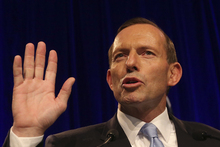Sep 11, 2013

Prime Minister Tony Abbott. Photo / Getty Images
Australian Prime Minister Tony Abbott faces a difficult challenge as his Liberal-led government tries to reboot the stalled mining boom at the same time as it persuades Australians to pull in their belts a bit to get rid of the budget deficit.
Axing the carbon and mining taxes will only go so far.
The international demand for hard commodities – particularly out of China – is still at a relatively low ebb.
It would be foolhardy to think that the rollicking mining profits of old are just around the corner again.
That is why the Liberals are likely to follow the desires of senior Australian business players for a broader rethink on the overall economy such as pushing forward with the much spruiked proposal to develop an Asian food bowl to capitalise on the growing demand for high-quality proteins among the Asian middle-classes.
It can only be to New Zealand’s betterment if Australia can get its finances quickly in order again and increase economic growth rates.
The country is still our second largest trading partner, the major destination for offshore investment from New Zealand and the first staging post for many of our companies when they go offshore.
Australia mops up our own excess unemployed – which is not to be scoffed at.
So, if Australia does well, chances are there will be a spin-off here due to increased demand for New Zealand goods and services.
But its also important that New Zealand does not rest on its own laurels either.
Australia is set to broaden its strengths. So, should we.
While Australia has been known as the quarry, New Zealand is also known colloquially as a farm, a tourist destination and a high-class island for international retirees to spend their summers.
The big question is what are we doing to leverage our own resources in the mining and oil and gas space, and to grow more innovation high-tech companies.
For this to occur New Zealand needs to remain strongly focused on increasing its own international competitiveness.
The World Economic Forum’s latest Global Competitiveness Index recently put New Zealand ahead of Australia for the first time.
New Zealand climbed five places from its 2012 ranking to come in at 18th on the overall ranking of global competitiveness, while Australia slipped one place to drop out of the top 20 for the first time with a score of 21.
The New Zealand Initiative’s Oliver Hartwich reckoned the improved ranking reflected the steady recovery of the local economy and prudent pro-growth policies that have been put in place to support it, helping New Zealand hold its competitive ground while other countries slipped back amid a weaker global growth outlook.
Hartwich said: “The performance is more startling when you consider that just five years ago New Zealanders were staring at ballooning deficits and a deep recession while the Australian government was debt free and riding the tailwind of a mining boom.”
The sobering point, as Hartwich cautioned, is that the country has failed to make any improvement on its innovation and business sophistication factors, ranking 27th globally – behind both Puerto Rico and Qatar.
This area – along with the lack of a well-educated workforce – holds New Zealand back.
Where we do stand to make gains is on increasing New Zealand’s own market reach.
The Trans-Pacific Partnership negotiations are inching towards a conclusion. But there will be pressure on Australia to do a dirty deal and carve out sugar from the final agreement.
When Prime Minister John Key meets up with Abbott soon, he needs to make strongly clear that New Zealand’s expectations are that Australia will hold the line to ensure a high-quality and comprehensive agreement.
Unfortunately, Australia has a slightly blemished record when it comes to trading deals – and respecting New Zealand’s point of view.
For instance, vanquished Prime Minister Kevin Rudd was a disaster when it came to forging strong relationships with New Zealand.
This country’s leaders – over successive governments – have fought hard to try and stop the relegation of New Zealand to a mere branch economy offshoot of Australia.
The single Australasian market initiative that was spearheaded by former Labour Finance Minister Sir Michael Cullen and former Liberal Treasurer Peter Costello did ultimately develop useful regulatory ties and commonalities across borders but only after the New Zealand side stood firmly against Aussie desires to relegate New Zealand’s institutions to beneath its own.
When Rudd did deign to come to New Zealand, his body language spoke volumes.
On one trip with former Labour leader Mark Latham, Rudd made sure he stayed just out of shot when he met with a small bunch of business luminaries at Auckland’s Hilton Hotel.
What really put the back up of New Zealand’s leaders – particularly former Prime Minister Helen Clark – was Rudd’s decision to try and spearhead the creation of an Asia-Pacific union, similar to the European Union, by 2020.
Rudd appointed veteran Australian diplomat Dick Woolcott to spruik the initiative.
But Rudd’s high-handed approach angered Clark who had invested a considerable amount of her own capital in the international sphere by building confidence in Apec and strengthening ties with both the United States and China.
It was obvious that Rudd saw New Zealand as a junior player (at most) in any conversations on the Asia-Pacific community.
Ironically, despite Rudd’s vaunted prowess with Mandarin and claims to understand the Chinese psyche, it was in fact Clark who went on to cement a free trade agreement with China and her Trade Minister Phil Goff who forged an agreement with then US Trade Representative Susan Schwab to launch the TPP negotiations.
New Zealand should now continue to take a competitive approach internationally and stay focused on making its own way.
